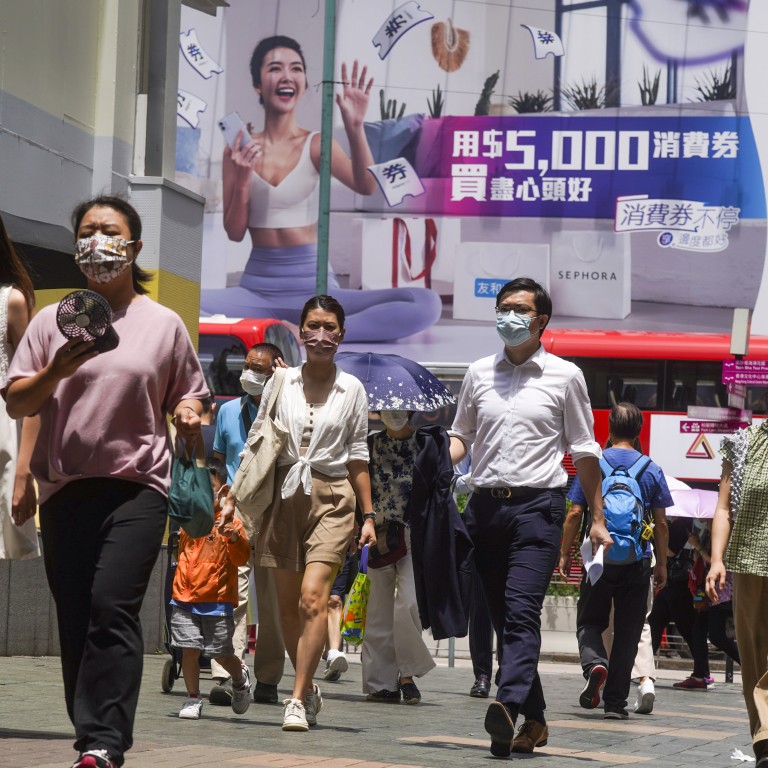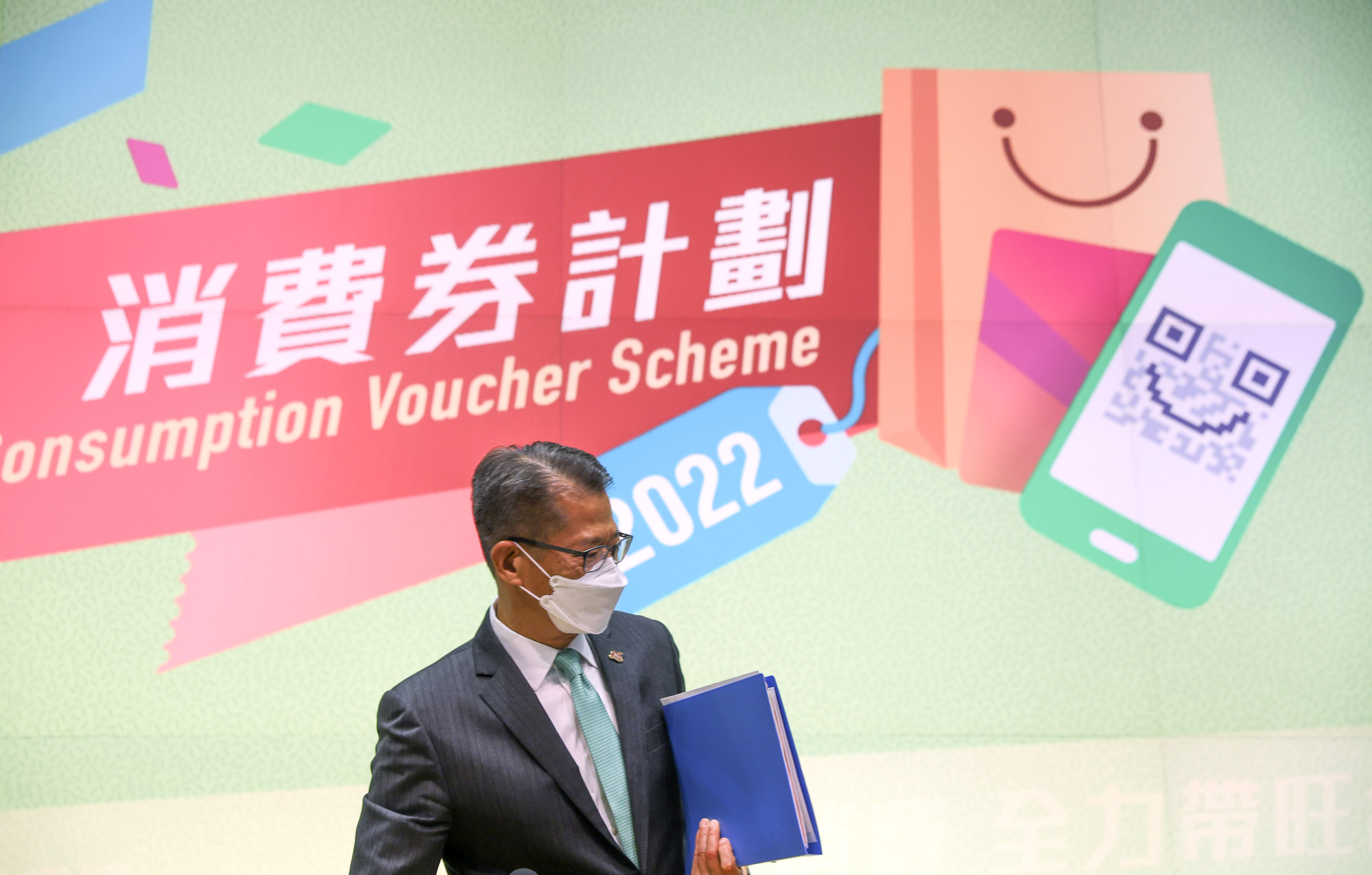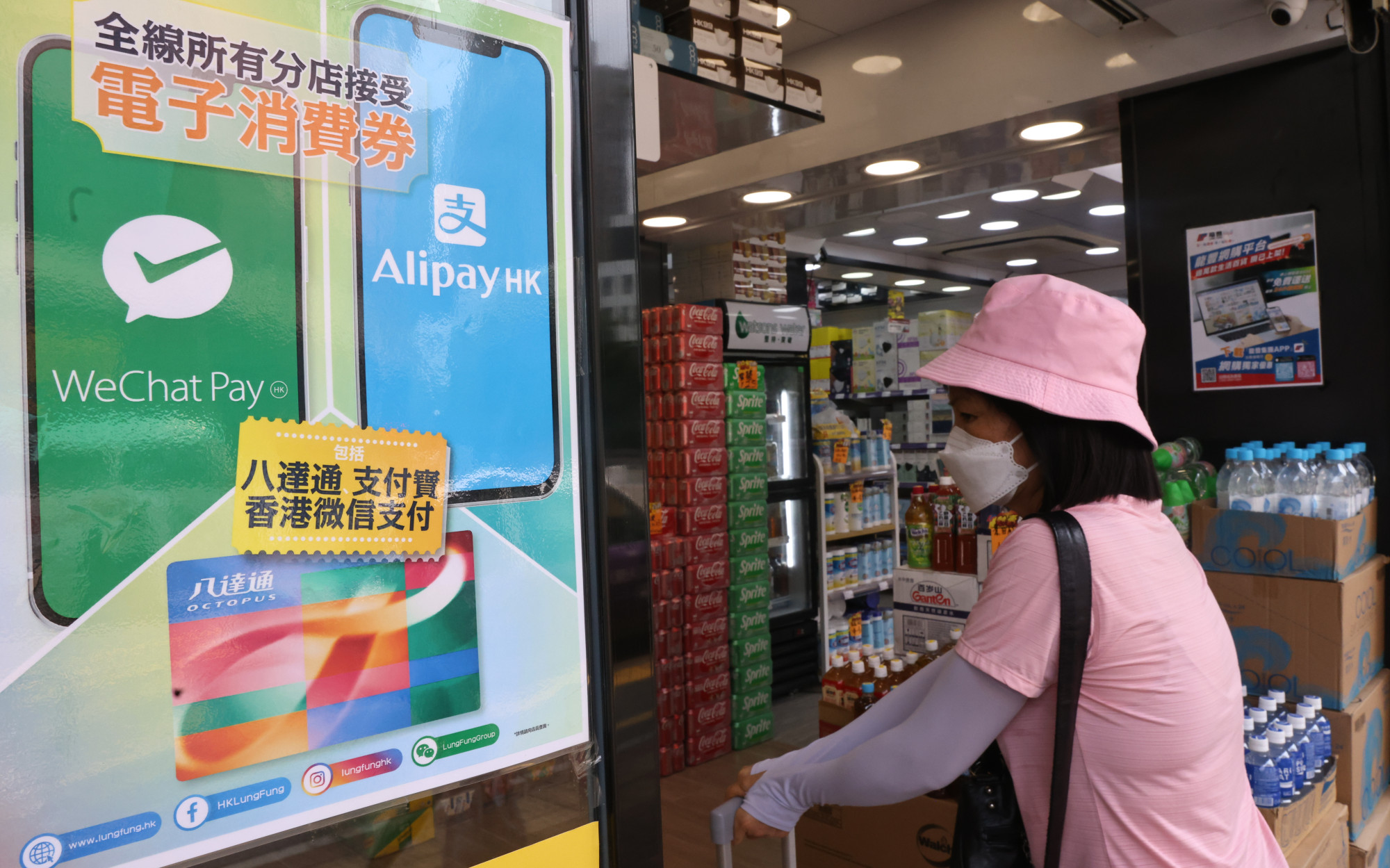
Consumption vouchers again for Hong Kong? Won’t help revive economy, say experts
- Finance minister Paul Chan has yet to decide whether to issue fresh round of consumption vouchers, with this year’s budget to be delivered on February 22
- Economist Simon Lee says some voucher recipients likely to use handouts to cover daily costs and saving up own cash for travel
Economists have cautioned against Hong Kong authorities giving out another round of consumption vouchers as part of this year’s budget, or to at least cut back on the amount, likening the scheme to “icing on the cake” that will have little effect in boosting growth.
Instead, they and some lawmakers argued on Tuesday, more effort had to be put into luring visitors to Hong Kong, with local businesses suffering as a result of a greater number of people leaving the city for the Lunar New Year holiday than arriving.
The government over the past two years issued e-vouchers to Hongkongers to support the pandemic-battered economy, with non-permanent residents becoming eligible for them in 2022.
Hong Kong finance chief pledges to spend wisely but does not rule out vouchers
Authorities handed out HK$5,000 (US$638) for the first round in 2021, while the second in 2022 was increased up to HK$10,000.
Simon Lee Siu-po, an economist and honorary fellow at the Asia-Pacific Institute of Business at Chinese University, on Tuesday told a radio programme the economic benefits generated by the previous rounds were not sustainable.
“As we are on our way back to normality, I don’t think a consumption voucher scheme is needed,” he said, referring to the recent reduction in the city’s anti-epidemic restrictions.
Financial Secretary Paul Chan Mo-po on Sunday said he had yet to decide whether this year’s budget, set to be delivered on February 22, would feature another round of handouts. He added that some political parties had expressed opposition during a closed-door meeting and highlighted heavy pressure on the city’s finances.

Lee said retail sales in October reached HK$31.9 billion just after the second phase of the 2022 scheme was launched, but dropped to HK$29.5 billion the next month.
“We should strive to boost the economy to pre-Covid levels,” he added. “If we keep stimulating the economy using our reserves, which are already dropping, the benefit would only last for a short while.”
Lee argued there was a limit on how much city consumption could boost the economy since external stimulus was absent. He said few tourists had visited the city despite the resumption of quarantine-free travel with mainland China this month.
Hong Kong’s retailing faces a slow slog even as border opens
On Monday, 76,946 people arrived in the city while 110,637 departed. Among those heading out of the city were 93,925 Hongkongers, including 63,870 who travelled to the mainland.
Over the week, Hong Kong had seen 408,671 people, including residents, arriving in the city. Some 742,647 people departed, including 666,859 residents.
With most recipients opting to receive their handouts on their Octopus cards, allowing them to pay for daily necessities, it was possible that some were not contributing to extra consumption in Hong Kong and were saving their own money to travel, Lee said.
Lee added that authorities could reduce the handouts to HK$5,000 per person to limit the impact on the city’s financial reserves, but insisted they would be far less beneficial than last year’s round of sweeteners.
Dr Billy Mak Sui-choi, an associate professor at Baptist University’s finance and decision sciences department, agreed the universal distribution of consumption vouchers was no longer necessary, calling it “icing on the cake”.
He said the city’s economic growth was expected to be stable this year, as the mainland border had reopened and business had largely returned to the retail and catering sectors.
Mainland Chinese aren’t biting as Hong Kong restaurants say lean times still here
Mak said he expected more mainland tourists to visit during the Labour Day “golden week” holiday in May though fewer high rollers would be among them due to a change in consumption habits across the border.
“The government has only HK$800 billion of financial reserves left, which is equivalent to about 12 months of government spending, and we used to have 20 months, this is definitely a matter of concern,” he noted, adding that a more targeted approach to support needy families would be more cost-effective.
However, Professor Terence Chong Tai-leung, an associate professor of economics at Chinese University, said the voucher scheme should be kept, but with the amount cut to HK$3,000 to lessen the impact on the city’s finances.
“At the moment, the number of people leaving the city still outnumbers arrivals. Local people are travelling abroad but we don’t have many foreign visitors, and local businesses will suffer from that,” he said. “And the public will surely be upset if they get nothing this year.”
Government advisers sitting on the Executive Council, the city’s top policymaking body, were also split on the matter, with convenor Regina Ip Lau Suk-yee dismissing the need for a fresh round of incentives as society was on track to return to normality.
But fellow Exco member Jeffrey Lam Kin-fung, of the Business and Professionals Alliance, on Tuesday said the scheme should be relaunched in tandem with measures such as tax rebates and interest-free loans for small and medium-sized enterprises to assist economic recovery.

Accountancy sector lawmaker Edmund Wong Chun-sek suggested the government focus more on attracting capital and tourists to the city to boost the economy.
“The last two times of voucher distribution indeed boosted the economy, but Hong Kong’s economy is driven by tourism at the end of the day,” said Wong of the Democratic Alliance for the Betterment and Progress of Hong Kong, the city’s biggest party.
Authorities should instead subsidise public housing or electricity bills to make better use of public funds, he added.
Lawmaker Kingsley Wong Kwok, of the Federation of Trade Unions, urged the government to retain the vouchers and consider allowing residents to use them to pay utility bills and rent.
“Hong Kong is seeing the light at the end of the dark tunnel, but it’s the hardest time and the government should lend people a helping hand,” he said.
“Compared with tax refunds, consumption vouchers can better stimulate the economy and alleviate people’s financial burden.”

